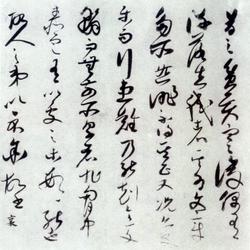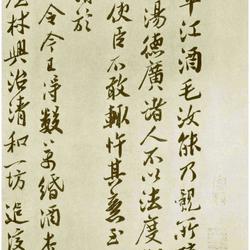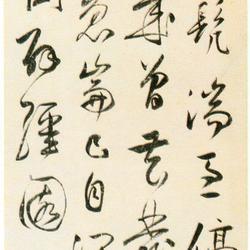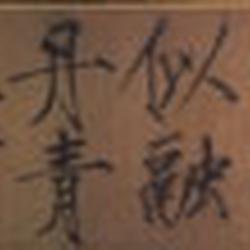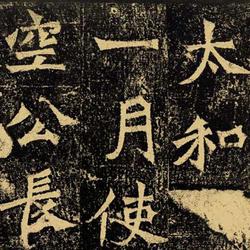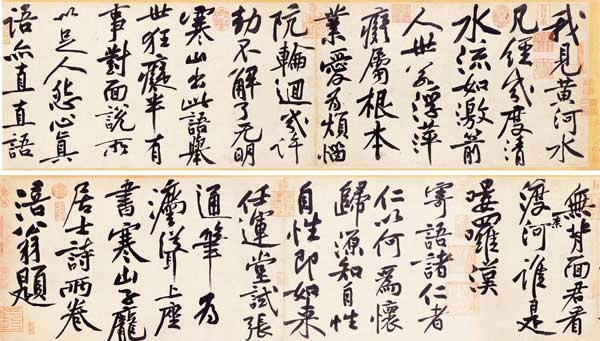
"Poems of Pang Jushi Hanshanzi" Paper volume 29.1x213.8 cm Collection of the National Palace Museum, Taipei
This kind of writing is concise and full of charm, the knots are dangerous and the words are stable in the middle. Often one or two long strokes are used to break up the white space, and coordinate with the movement of Qi to create a strong momentum. As Huang Tingjian represents the calligraphy style, he is personable and has his own style.
Huang Tingjian's special pen movements when writing often cause breaks in the middle of horizontal lines due to excessive movements.
The deliberately elongated strokes used by Huang Tingjian are full of rippling gestures and change without any reason. In addition to adding variety to the knotted characters, it also breaks up the gaps between the lines, making the whole work more colorful. The different ways of writing three points of water, as well as the ingenious arrangements and changes, all show Huang Tingjian's ability and ingenuity in forming characters.
In the first year of Shaosheng's reign (1094), Zhezong was dismissed from his official post and demoted to Qianzhou (Pengshui County, Sichuan) for compiling "Records of Shenzong". In the first year of Yuanfu (1098), he went to Rongzhou (Yibin, Sichuan) and settled in Wudeng Zen Temple in the south of the city. During autumn and winter, with the assistance of local scholars, lay Buddhists, and Zen master Wu Deng, a residence "Ren Yuntang" was built next to the temple.
Seal Description Explanation Seal Owner Introduction
(Taizhou City Defense Arrival) Official Seal of the Southern Song Dynasty
There are several treasures from Shiqu Baoji, Chunhuaxuan, Qianlong Chenhan, Xintian Master, Qianlong Yulan, etc. Hongli (1711-1799), Emperor Gaozong of the Qing Dynasty, was the fourth son of Emperor Shizong of the Qing Dynasty. He was the best among the emperors of the Qing Dynasty in his literary and martial arts skills. Emperor Gaozong of the Qing Dynasty also loved to appreciate calligraphy and painting. He once compiled the palace collection into "Secret Palace Pearl Forest" and "Shiqu Baoji" in several huge volumes. During his sixty years in office, his temple was named Gaozong and his reign was named Qianlong.
The Third Collection of Baoji, Jiaqing Imperial Treasures, Jiaqing Appreciation Renzong of the Qing Dynasty Yong Yan (1760-1820), the fifteenth son of Emperor Gaozong of the Qing Dynasty, succeeded him as emperor and reigned for twenty-five years. His posthumous title is Rui, his temple name is Renzong, and his reign name is Jiaqing.
(Shangqiu Song Luo) Calligraphy and Painting Palace Seal, (Bao Xiushi Kai) Xin Yisha, Shangqiu Song Luo Approved Authentic Song Luo Song Luo (1634-1713), a native of Shangqiu, Song Dynasty, named Muzhong, also known as Mantang, also known as Mantang Xipi. During the Kangxi period, Yinzi entered the official position. After being tired of the official position, he became the Minister of the Ministry of Personnel and was added to the position of Prince Shaoshi. He is good at connoisseurship and painting, and has written books such as "Xipi Lei Manuscript" and "Collection of Poems of Mianjin Mountain People".
Zhang Unknown
Neifu Books, Shaoxing Emperor Gaozong of the Song Dynasty Zhao Gou (1107-1187), whose courtesy name was Deji and whose name was Shanzhai. Gong calligraphy. The ninth son of Huizong, he was granted the title of King Kang, and the second year of Jianyuan: Jianyan and Shaoxing. In the thirty-sixth year of his reign, he passed on the throne to Emperor Xiaozong and was honored as the Supreme Emperor. He was located in the "Deshou Palace". The tomb number is Siling.
() Bai Sun Unknown
Chang, Yuesheng Jia Sidao Jia Sidao (1213-1275), courtesy name Shixian. Tiantai people. The official is the Prime Minister on the right, and the Taishi is responsible for Ping Zhangjun's state affairs. Jia Shezi, the sister of Li Zong, was a noble concubine during the reign of Emperor Zong. She was granted the title of Emperor Zongli and was given the title of Di Ge Ling. She built a half-room hall where she could collect literature, play, calligraphy and paintings. The soldiers of the Yuan Dynasty forced Jiankang to pick up the training envoy from Gaozhou, but he was killed by Zheng Huchen.
Gong Zijing Gong Ying Gong Ying (1266-1331), named Zijing. Gaoyou people. In the Yuan Dynasty, he was the head of Hejing and Xuedao academies and the deputy director of Confucianism in Jiangsu and Zhejiang. There is "Cun Hui Zhai Ji".
Unknown number of prints
Title and postscript Author Introduction to the author
Siling Hao Valley Book. This volume was tasted in Shaoxing Jiaku. Then he returned to Qiuhe. Picture three. The top is joyful life. Lower long characters. At the bottom is his name. Official seal at the beginning of the volume. At the end of Deyou. Born in his family. Anyone who joins the officialdom. All have Taizhou to resist Ku Yinyun. The twenty-third day of March in the fourth year of Yanyou (1317). Gaoyou Gong Yingshu.
Gong Ying Gong Ying (1266-1331), a native of Gaoyou, named Zijing.
Explanation: I have seen the water of the Yellow River, which has been clear for several times.
The water flow is like an arrow, and the human world is like duckweed.
Insanity is the fundamental karma, and love is the pit of troubles.
How many kalpas have passed through reincarnation and ignorance.
When Han Shan said this, the whole world went crazy.
If you have something to say to someone, it's enough to make people complain.
The true words from the heart are also straight, and the straight words have no backside.
Look at Du Naihe, who is the Arhat?
A message to all benevolent people, what is the purpose of benevolence?
Return to the source and know your own nature, which is the Tathagata.
I have seen that the water of the Yellow River has become clear several times.
The water flow is like an arrow, and the human world is like duckweed.
Insanity is the fundamental karma, and love is the pit of troubles.
How many kalpas have passed through reincarnation and ignorance.
When Han Shan said this, the whole world went crazy.
If you have something to say to someone, it's enough to make people complain.
The true words from the heart are also straight, and the straight words have no backside.
Look at Du Naihe, who is the Arhat?
A message to all benevolent people, what is the purpose of benevolence?
Return to the source and know your own nature, which is the Tathagata.
Ren Yuntang tried Zhang Tong's writing method and sat on the throne
Shu Hanshanzi Pang layman's poems in two volumes inscribed by Fu Weng

